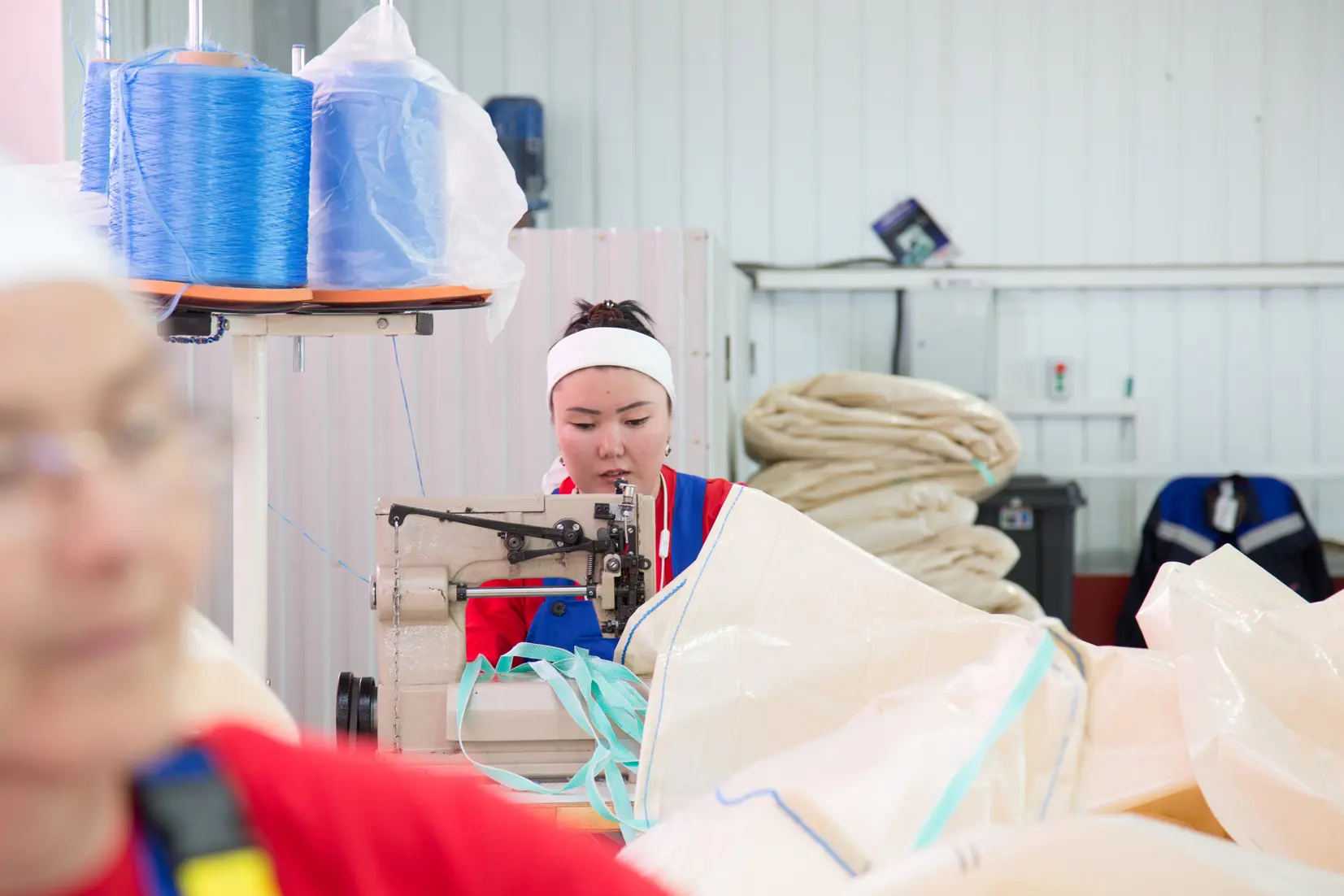
Every day, railcars loaded with crushed and granulated sulphur depart from Tengiz in various directions. Transportation of such products with sales volumes exceeding 2.4 million tons per year is not an easy thing to do. Sulphur, among others, as bulk material subject to oxidation in a humid environment and sensitive to UV and static electricity, tends to smolder and smoke. The solution to its safe transportation was found in the use of railcar liners.
The use of such liners for the transportation of Tengiz sulphur began in January 2017. According to Kanat Kenzhebayev, Logistics Coordinator, TCO Marketing & Transportation, it became clear that the benefits of using railcar liners or as he calls them, envelopes, do not end with ensuring protection during transportation.
“Envelopes allow you to isolate the product from external environment, eliminating chemical reactions with the ambient environment or contact with moisture. In addition, they prevent its “natural loss” due to spilling or blowing. The car liners is a bulk transportation method that prevents and hampers unauthorized access to the product during transportation.” – says Kanat.
When the railcars with Tengiz sulphur reach the destination point, the liners are opened, and the product is unloaded through the lower hatches of the gondola car. It is not required to clean up the railcars upon their return to Tengiz, which significantly reduces the time spent on preparing the cars for loading the next batch.
One of the suppliers of such liners is FIBC Kazakhstan from Aktobe. Along with other Kazakhstani companies, FIBC Kazakhstan managed to completely replace imported liners.
FIBC (Flexible Intermediate Bulk Container) Kazakhstan, was established in a rented workshop where big-bags for bulk materials were made using two machines. Then, few people thought that the company would become one of the main suppliers of soft containers for the transportation of Tengiz sulphur. FIBC Kazakhstan CEO Botagoz Taibukenova did not presume this either. And on June 6, 2019, just some three years after the company was established, she stood at the door of the newly built railcar liners manufacturing factory and was welcoming guests who attended the opening ceremony.
Mrs. Taibukenova admits that the main driver of their development has become cooperation with Tengizchevroil that buys up to 70% of all product manufactured by the enterprise.
“When we first started working, we tried to participate in all possible bids, sent commercial proposals to all companies that could come to mind. We were looking for any opportunities to promote our products,” – she shares her memories.
Then, during the first visit of the TCO management to Aktobe oblast with a view to determine the opportunities of the local market, we managed to attract the attention of the major oil company to our products. From a short conversation with them, it became known that TCO is interested in localizing the production of railcar liners.
Potentially, FIBC Kazakhstan had opportunities, but had no experience.
According to Ms. Taybukenova, they took a sample of products made in Russia, brought them to the workshop and began to study the technology that was used to produce these liners. It would seem a simple product. But, the efforts to sew the first liner took the whole day. However, this did not prevent the company from sending documents to TCO requesting to include in the database of potential TCO suppliers.
After some time, a group of specialists from TCO visited FIBC Kazakhstan’s production site. Future customers examined the production process and shared their recommendations which helped them make a prototype of a carriage liner that meets TCO specifications. So, in the beginning of 2018, FIBC Kazakhstan was invited to bid and won a permanent contract to supply TCO with railcar liners, and thirty Kazakhstanis received a permanent job.
Two years later FIBC Kazakhstan completed the first stage of expansion – their own factory was built and commissioned in the industrial innovation zone in Aktobe. The opening ceremony was attended by Deputy Akim of Aktobe oblast Mavr Abdullin, representatives of SEC Aktobe and NCE Atameken, Zinaida Zharikesova, Senior Purchaser and Zhazira Sissenbayeva, Strategic Contracts Specialist, TCO Supply Chain Management.
The honor to cut the red ribbon during the opening ceremony was given to Zhazira Sissenbayeva. This shows how TCO representatives are valued at FIBC Kazakhstan. In turn, according to Ms. Sissenbayeva, TCO also appreciates a reliable partnership with its suppliers who are able to ensure uninterrupted supply of high-quality and cost-effective products. In addition, she stressed that since 1993 TCO has spent over 29 billion USD on Kazakhstani goods and services.
At present, FIBC Kazakhstan can increase its production output to additional 40% and, in case of demand, they can maximize their production to full capacity. In addition, the company has ambitious plans. The company’s next stage of expansion involves the purchase of necessary equipment to produce polypropylene fabric, which will create additional jobs. It is expected that by the end of expansion, the proportion of local content in FIBC Kazakhstan will increase to 98%. These plans are very closely related to current market conditions where TCO plays a great role.